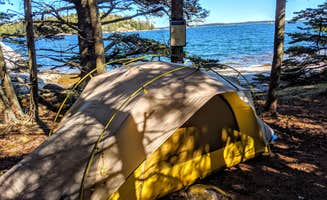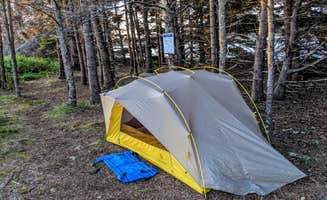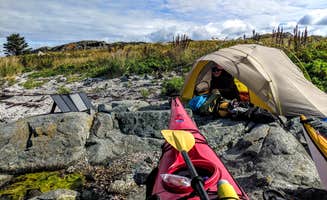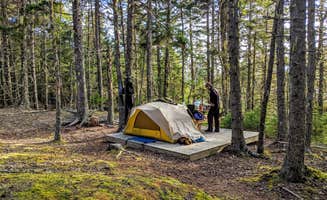Dispersed camping near Monroe, Maine centers around the Maine Island Trail Association (MITA) managed islands in the Gulf of Maine. The Deer Isle Archipelago provides primitive camping opportunities accessible only by watercraft, with most sites situated at sea level among coastal forests and granite shorelines. Water temperatures in this region typically range from 50-60°F during summer months, requiring proper cold water paddling preparation.
What to do
Wildlife observation: Buckle Island offers excellent opportunities for watching coastal birds and marine life. The eastern shore provides good landing spots with "sandy shore, which is exposed for a good portion of the day" making it accessible for paddlers.
Island exploration: The trails on Marshall Island provide walking opportunities through coastal forest. According to one camper, this island offers "some of the best stargazing spots we've ever seen" due to minimal light pollution.
Photography opportunities: The shell-covered beach at Doliver Island creates unique visual compositions, especially at low tide. A camper noted it has a "gorgeous shell covered beach and a beautiful view of Isle au Haut, just next door."
What campers like
Sunset views: The western-facing site on Wheat Island provides exceptional sunset viewing. Campers report having "a gorgeous view of the sun setting and full moon rising" from the southwest campsite.
Beginner-friendly options: The eastern beach at Buckle Island makes first-time island camping more accessible. One reviewer specifically mentions it's "perfect for those new to sea kayak camping" due to the landing conditions.
Beach fires: Sand Cove on Marshall Island permits campfires in designated areas. A camper describes it as "truly gorgeous wooded area with a tent platform and a picnic table at each site."
What you should know
Tide planning: Access to these islands varies significantly with tide levels. Wheat Island "can be a tricky island to land on at high tide, so plan accordingly" according to experienced paddlers.
No facilities: None of these sites provide drinking water, toilets, or trash removal. Campers must bring wag bags for waste and pack out everything.
Seasonal insects: Even in September, mosquitoes remain prevalent on most islands. One Doliver Island camper reported mosquitoes "were pretty bad all day long" during an early September visit.
Emergency services: The nearest medical facilities are on the mainland. All islands require self-rescue planning and marine VHF radio for emergencies.
Tips for camping with families
Capacity considerations: Site selection should account for group size. The southwest site on Wheat Island is noted as "perfect for larger groups" while Doliver Island has "barely a tent space" and accommodates only small parties.
Island hopping: Planning multi-island itineraries works well for families with paddling experience. One group completed "our 9 day journey" through the archipelago, using Doliver Island as "a perfect launching spot for crossing Jericho Bay."
Reward opportunities: Maine Coast Heritage Trust offers incentives for conservation work. As one camper noted, "if you do a beach clean-up during your stay and send in a picture, you will receive a Maine Coast Heritage Trust hat!"
Tips from RVers
Mainland staging: No RV camping exists on these islands, but mainland staging areas near launch points accommodate overnight RV parking.
Supply planning: Stock all supplies before departing the mainland. Swan's Island has "a very small grocery store and town office with fresh water" for emergency resupply, though reaching it requires additional paddling.
Security considerations: Vehicles left at mainland launch points should have valuables removed. Multi-day island camping requires secure mainland parking arrangements.





